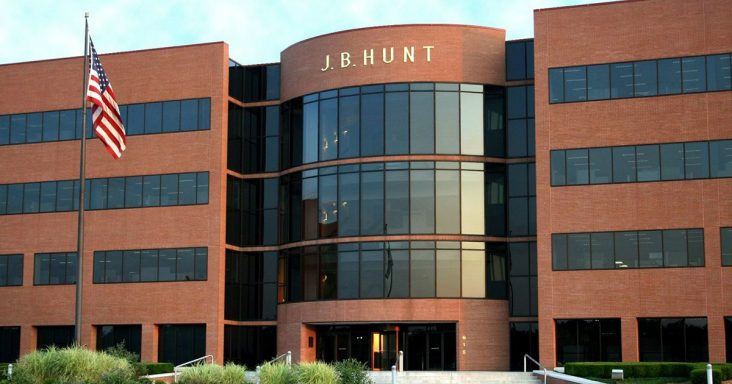J.B. Hunt to pilot hydrogen-fueled electric trucks in 2022
by January 27, 2021 12:04 pm 2,301 views

J.B. Hunt Transport Services Inc. will be the first to test hydrogen-fueled electric trucks produced by truck manufacturer Navistar International Corp. as the Lowell-based carrier continues to invest in electric trucks.
In collaboration with vehicle maker General Motors and hydrogen fuel company OneH2, Lisle, Ill.-based Navistar announced Wednesday (Jan. 27) plans to make its first production model International RH Series fuel cell electric vehicle commercially available in model year 2024. J.B. Hunt is expected to start testing the truck on its dedicated routes at the end of 2022. The new trucks are expected to have a range of more than 500 miles and be fueled with hydrogen in less than 15 minutes.
“J.B. Hunt is committed to delivering more while using less, and this new fully-integrated solution offers a prime opportunity to do that,” said John Roberts, president and CEO of J.B. Hunt. “As we serve our customers and communities, the combination of hydrogen fuel cell technology and refueling capability will enable us to reduce emissions along with energy consumption, fulfilling our environmental sustainability commitment to our customers and the communities we serve. We are excited for the potential of this innovative business model and look forward to sharing our learnings from this pilot program with Navistar and its involved technical and infrastructure partners.”
The International RH Series fuel cell electric vehicle will receive its energy from two GM Hydrotec fuel cell power cubes. Each Hydrotec power cube contains more than 300 hydrogen fuel cells and has thermal and power management systems. The power cubes are compact and can be used for multiple applications, according to a news release.
“Hydrogen fuel cells offer great promise for heavy-duty trucks in applications requiring a higher density of energy, fast refueling and additional range,” said Persio Lisboa, president and CEO of Navistar. “We are excited to provide customers with added flexibility through a new hydrogen truck ecosystem that combines our vehicles with the hydrogen fuel cell technology of General Motors and the modular, mobile and scalable hydrogen production and fueling capabilities of OneH2. And we are very pleased that our valued customer J.B. Hunt has committed to utilize the solution on dedicated routes and to share key learnings.”
The combined propulsion system within the new truck is expected to have better power density for short-range travel, better short-burst kilowatt output and a per-mile cost that’s comparable to diesel in specific market segments, the release shows.
“GM’s vision of a world with zero emissions isn’t limited to passenger vehicles,” said Doug Parks, executive vice president of global product development, purchasing and supply chain for GM. “We’re thrilled to work with like-minded companies like Navistar and OneH2 to offer a complete solution for progressive carriers that want to eliminate tailpipe emissions with a power solution that can compete with diesel.”
In a partnership agreement with Navistar, OneH2 will supply its hydrogen fueling services, including hydrogen production, storage, delivery and safety. Also, Navistar has taken a minority stake in OneH2. In the short term, OneH2 is expected to add hydrogen heavy-truck refueling infrastructure to accommodate for more than 2,000 of the new trucks along with its existing truck fleets.
“We’re excited about the opportunity to partner with Navistar,” said Paul Dawson, president and CEO of OneH2. “We believe strongly that hydrogen fuel is the future of zero-emission renewable energy in the heavy truck market and are pleased that this agreement will provide additional scope for its application. Under this agreement, we will be able to offer fleets a zero-emission truck with total cost of operation lower than diesel in key segments of the industry.”
This past fall, J.B. Hunt started testing the electric Freightliner eCascadia. In 2018, J.B. Hunt ordered 40 Tesla Semi trucks. Also that year, J.B. Hunt added five Mitsubishi Fuso eCanter trucks to its fleet as the carrier’s first all-electric trucks.
For 2020, J.B. Hunt’s earnings fell 1.9% to $506.03 million, from $516.32 million in 2019. Revenue rose 5.1% to $9.63 billion in 2020, from $9.16 billion in 2019. J.B. Hunt recently announced a 1-cent per share increase in its cash dividend. The company on Feb. 19 will pay a 28-cents per share dividend to stockholders of record as of Feb. 5.
On Jan. 26, Susquehanna analyst Bascome Majors downgraded J.B. Hunt stock to neutral from positive with a 12-month target price of $150, down from $152, according to The Fly. “The valuation ‘de-rating’ that hit asset-based truckload in the second half of 2020 will likely spread to other truckload-related businesses by the second half of 2021,” Majors said. “The ‘excellent backdrop’ for truckload suggests 2021 could be peak earnings.” This led Majors to have a “more conservative valuation framework across the space.”
Shares of J.B. Hunt (NASDAQ: JBHT) were trading Wednesday at $136.72, down $6.74 or 4.7%. In the past 52 weeks the stock has ranged between $156.74 and $75.29.
